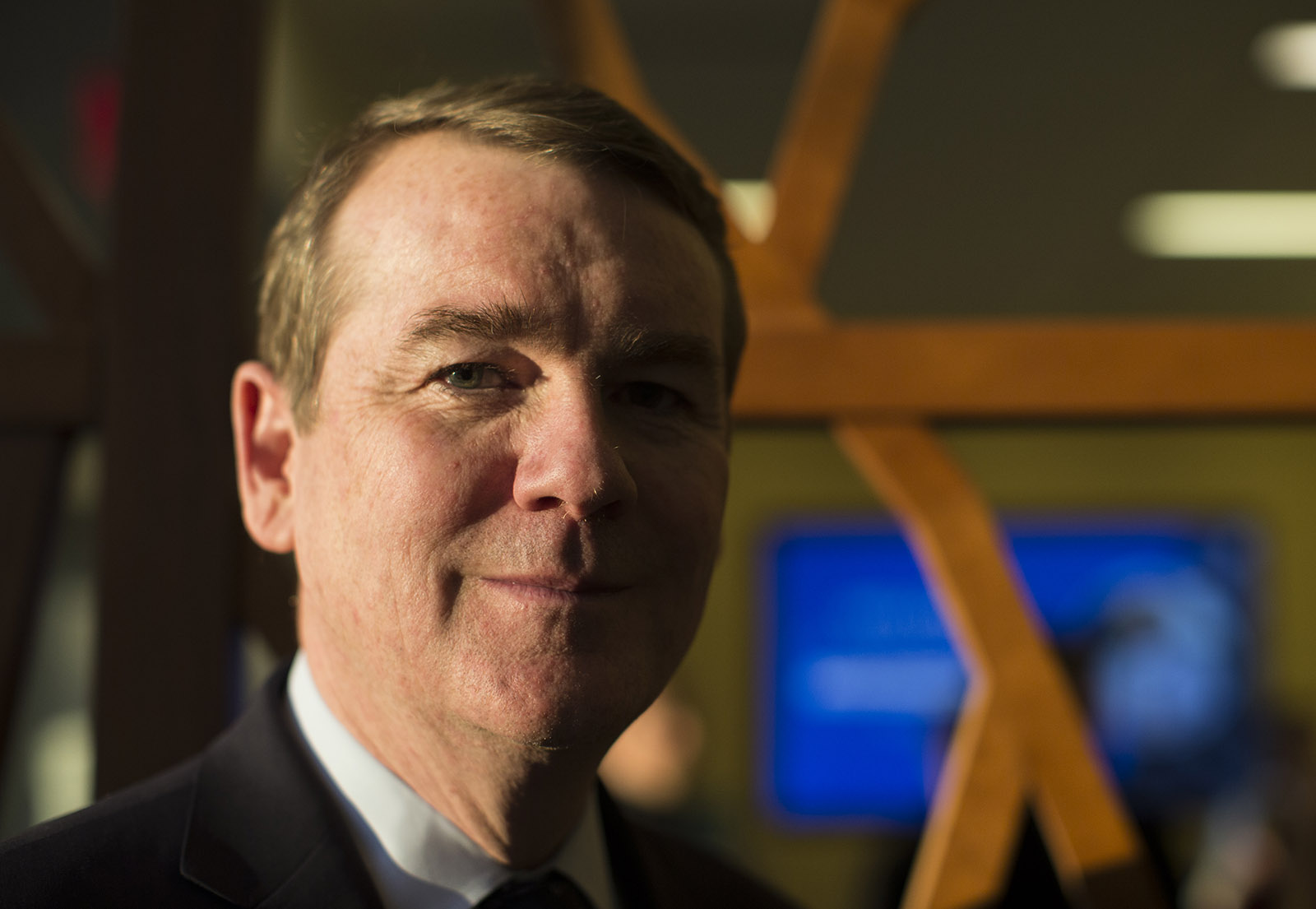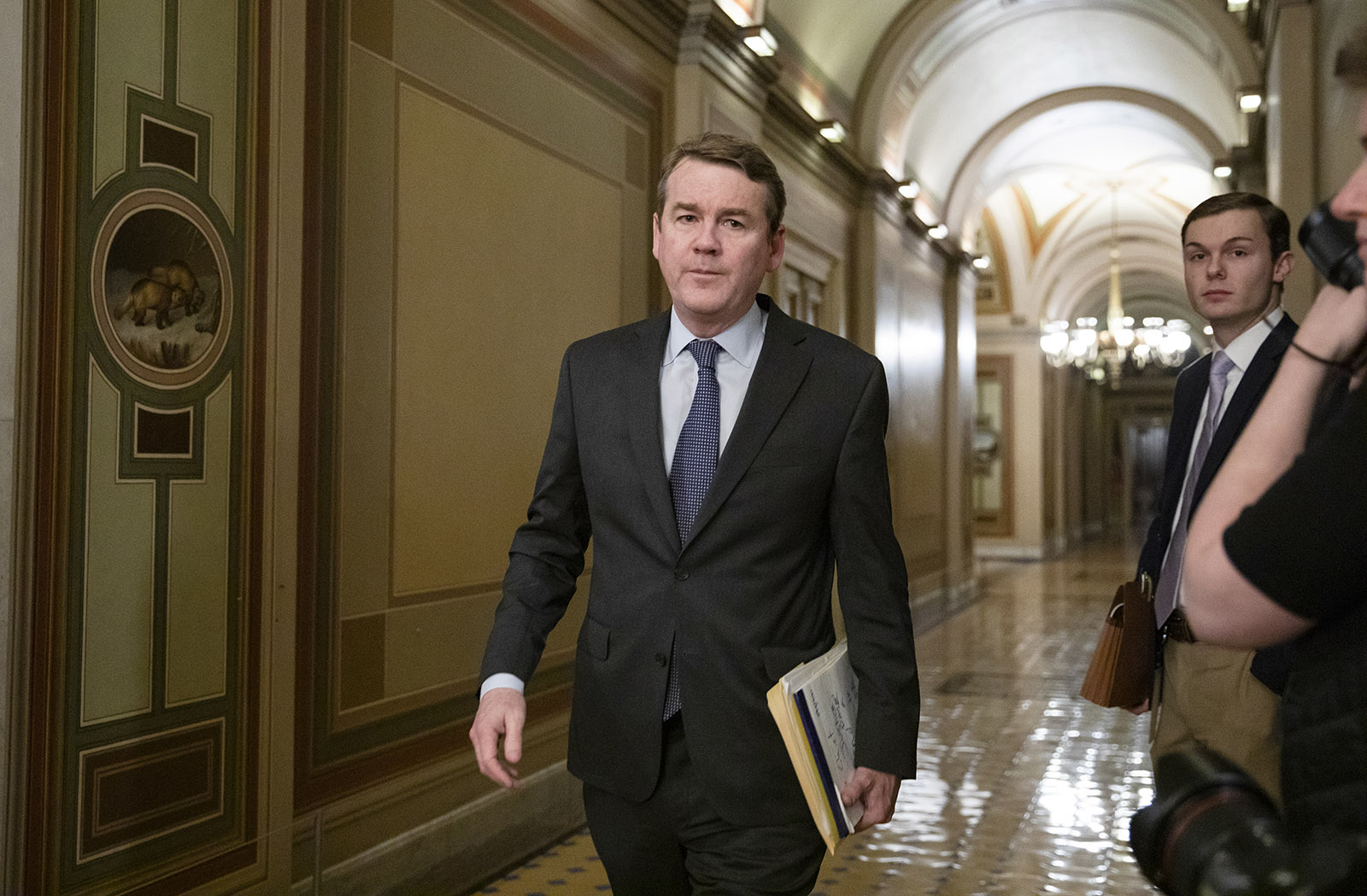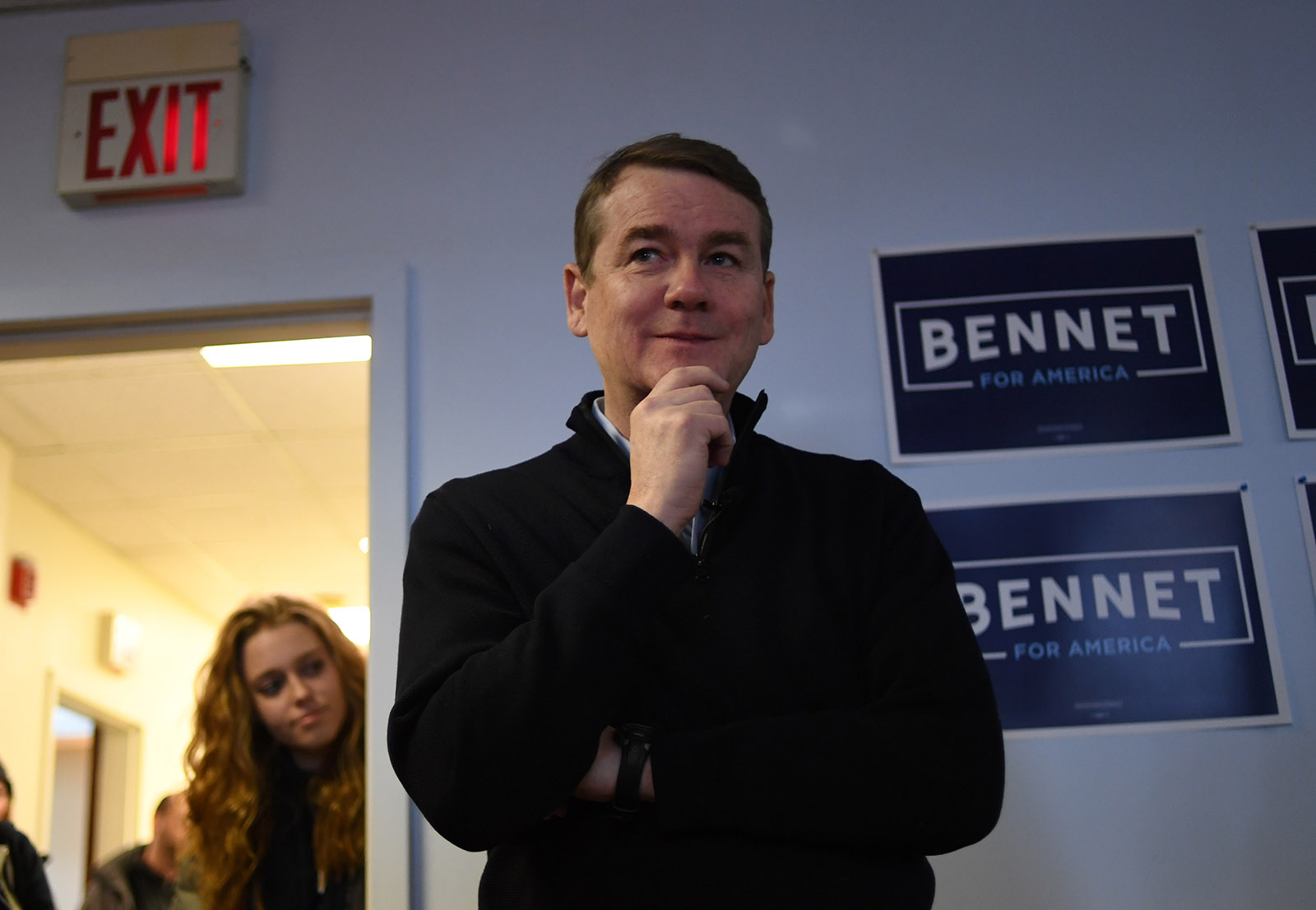“We are a nation of readers,” US Senator Michael Bennet, Democrat of Colorado, wrote last year, shortly after announcing his run for president. At the time, I wondered about that. Bennet ended his campaign on February 11 in New Hampshire. Before he ran, he read history and journalism for “six or eight months” to moor himself by gaining a long view on the present threats to American democracy.
Bennet’s friend Brad Jupp, a former middle school language arts teacher from Colorado and current adviser to Bennet, helped assemble the reading list, which included speeches and writings from a group of American founders, broadly interpreted, like Frederick Douglass and Emma Lazarus, recent histories such as Jill Lepore’s These Truths (2018), reportage like Nancy Isenberg’s White Trash (2016), Plutarch, and Montesquieu. In his own book, The Land of Flickering Lights: Restoring America in an Age of Broken Politics (2019), Bennet lists thirty-eight authors in all—his answer to the question posed him in the prior months: “What are you reading these days?”
Bennet is not the first presidential candidate to turn to history for answers, nor the first to make his reading a matter of public relations—before he first ran for governor of Texas, George W. Bush read Myron Magnet’s The Dream and the Nightmare: The Sixties’ Legacy to the Underclass (1993), which his adviser Karl Rove later cited as a central influence on Bush’s presidency. During the 2008 election, the writer Jon Meacham solicited Obama’s list of significant books and writers. The soon-to-be president-elect emailed Meacham a bibliography of some two dozen titles.
In our noisy age, Bennet’s retreat-and-read strategy was a contrast to other candidates who advanced their cause in measures of volume and speed—by saying yes to every broadcast interview or building digital armies. How did the solitary study of history serve him in pursuing the overloaded attention of Democratic voters?
Two weeks after Bennet ended his campaign at the New Hampshire primary, I sat with him in his Senate office, in Washington, D.C., where, in somewhat worshipful fashion, stacks of books tagged with Post-It’s tiled the coffee table. What follows is an edited transcript of our conversation.
Susannah Jacob: You read widely to prepare for your campaign and write your book. How did you decide what books to read?
Michael Bennet: I worked with a friend of mine named Brad Jupp—I write about him at the end of the book—who’s a middle school teacher, when he’s not leading union strikes in Denver, which he did in the early 1990s, or working with me to develop a new compensation system for teachers. We put together—he mostly put together—a set of binders of American writings throughout history, domestic and foreign policy, that he and I read together for a number of months.
On the campaign trail, you gave people copies of David W. Blight’s Frederick Douglass: Prophet of Freedom (2018) and Casey Gerald’s There Will Be No Miracles Here (2018). Why those books?
[Douglass] made a very important contribution to American history when he began to make the opposite argument that the abolitionists were making, that the Constitution was an anti-slavery document, not a pro-slavery document. The abolitionists would argue that it was a pro-slavery document.
I can feel the political power in making that conversion and saying, no, the issue is not that we’ve got to tear up the founding document; the issue is that we’ve got to live up to the words that are in that founding document. We’re not living up to the words.
Reading Casey’s [Gerald’s] book might give people a sense of what it would be like if we thought of all of the next generation as founders, too. In other words, not necessarily as a future president, but the kids in my old school district as people who have a responsibility to build the democracy, to build the republic, and therefore need to be included in the democracy, included in the republic.
There Will Be No Miracles Here is the title of his book because he tells the story of how his story is not a story of great personal perseverance that somehow beats the odds and shows that anybody can do it, but instead what he says is, my story is a testimony that so many kids in America are getting left behind because of all kinds of aspects of American society.
You write about expanding the notion of our founders and adding people in our history and in contemporary life who expanded America’s progress—Frederick Douglass, Elizabeth Cady Stanton, José Martí, others. I would love for you to continue to explain and elaborate, but also clarify precisely what that means.
Advertisement
I think that the job of Americans since the founding—which we’ve never done perfectly, ever, including at the founding itself, obviously—has been to make this country more democratic, more fair, and more free. Small-d democratic, more fair, and more free. And to fight to force America to keep the promises that America made on the page, as Martin Luther King Jr. put it the night before he was killed in Memphis.
I still think that’s our job as American citizens. I believe every single one of us has the responsibility to be a founder. In our time what that means to me is, among other things, making sure that every single person that’s eligible to vote actually casts a vote in this country, and making sure that every kid in America who’s born poor has the chance to get out of that poverty, get a quality education, so they, too, can participate in the democracy.
How should we reckon with the original founders’ mistakes and, at the same time, take direction from them? How do you approach that?
I do that every single time I have a middle school class or a high school class come visit me. We talk about how the building they’re sitting in was built by enslaved human beings. Not this building, but the Capitol across the street.
And that leads to a discussion about Frederick Douglass, about the Civil War, about what was at stake, because I tell them the founders did two astonishing things in their generation: they led an armed insurrection against the colonial power that succeeded—we call that the Revolution—and they wrote a Constitution that was ratified by the people that would live under it.
They [also] did something horrific and reprehensible, which is that they perpetrated human slavery. It took other Americans to correct that terrible wrong, just as it took generations of Americans to fight so that women in this country would have the right to vote, so that my daughters could have the right to vote. I think of those people as founders, too, as consequential and as substantial as the people who wrote the Constitution.
How do the middle schoolers respond?
I hope what they take away from it is a sense that this wasn’t all just here. Two hundred and thirty years ago, none of this stuff was here, and there’s no reason to expect that it will still be here two hundred and thirty years [from now], unless we do our job.
How did your reading come up in conversations with people you met while campaigning?
George Packer’s Unwinding (2013), which is on that table somewhere, and Matthew Desmond’s Evicted (2016) both speak exactly to the underlying contemporary issues that we’re facing in our economy, an economy that for fifty years has not worked well for most Americans. When I’m on the campaign trail I hear people say, “We’re working really hard [and] can’t afford housing,” [or] healthcare, some combination of housing, healthcare, education, early childhood education. I think about the families in my school district who say, “We are killing ourselves, no matter what we do, we can’t get our kids out of poverty.”
Desmond does a very, very good job of close-quarter reporting back to America on the effects of federal housing policy, how it has made working peoples’ lives more difficult in many cases, not easier. And I think in Packer’s reporting, what you see is the strains on a democracy when you’ve got an economy that works well for the people at the very top but not for everybody else.
What about the history? Were there times when you were learning from exposure to people on the campaign trail, where you saw the parallels between observations made in the history to people you were meeting or what they were describing?
There’s really nothing new under the sun. I think we have a tendency to over-assess the novelty of new conditions that arise, and we also have an under-appreciation for the effect we can have as individuals on history. Including elected officials, but I wouldn’t say just elected officials.
How did the Americans you met while campaigning alter the conclusions you drew from the reading?
I came to believe that there were two primaries going on in America. One primary was the primary that dealt with the living, breathing concerns of families in America that are captured in Packer’s or Desmond’s books. The other primary was directed toward the Americans who interact with their politicians on social media, which is a very small percentage of people in America, and a far smaller percentage of people than are trying to navigate this difficult economic time and political turmoil.
Advertisement
I feel as though history roots you in a way that allows you to get through the Twitterstorm that’s now less than a twenty-four-hour cycle. I think that’s important: our leadership needs to be people who have deep enough keels to weather that social media turmoil—and many do not. I mean, [Senate majority leader] Mitch McConnell is not somebody who cares very much what they say about him on social media.
Were there images of that, examples of people who made that clear in a way? That contrast you’re drawing?
We were in this small railroad town in Iowa. We walked around and you could see the bones of a civilization, really, in the buildings that were there. We went into a coffee shop to have a town hall meeting, and on the walls were photos of an earlier time with people dressed in full-length white dresses on Sunday, probably going to church or from church, and several pharmacies on Main Street. Just a lively, robust place. And the people sitting in this community had a lot to complain about. Except they weren’t complaining, they were expressing how difficult their lives were.
I remember sitting there and having a woman say, “I try to go see my father every three or four weeks. We moved him to another town, actually in another state,” because there were no nursing services in that community. “He worked his whole life in order to be able to save enough to be able to provide for himself at the end. Now he only has nine months of savings left. What are we gonna do?” I was struck by the dignity of that question and the dignity of what she represented.
Jill Lepore argued in 2018 that “the rules that prevail on the Internet were devised by people who fundamentally don’t believe in government.” Is she right, and what does that mean for our presidential elections?
I think the evidence is that she’s right. It was not obvious to me at the outset that social media should not have been a democratizing force for our country. In other words, in my simple mind you can think about it as being able to have a virtual town hall with everybody in America. But that hasn’t been the way it’s worked out. Instead, it’s propped up tyrants, here and in the Middle East, and if they [the social media companies] are unwilling to self-regulate, we’re going to have to find a way to regulate them. The damage that Facebook is doing, in particular, to our democracy is very significant.
Was there a connection between the past and the present we’re living in, or are we too far gone?
I don’t think we’re too far gone, but I do think we need to relearn our own history, so we can remind ourselves that we didn’t get here by accident and we didn’t get here because some people wrote a document two hundred and thirty years ago. And we’re not perfect. But Americans, over and over again, have shown up and, as I said earlier, struggled to make the country more democratic, more fair, and more free, a little more perfect.
Our current president has no appreciation for our history. I don’t think he even believes in democracy or the separation of powers, the independence of judiciary, freedom of the press, freedom to assemble. And any candidate that’s running on the other side believes in all of those things.
Donald Trump ran for president arguing, “I alone can fix it.” That’s what he claimed, and that’s exactly the opposite of how this is supposed to work. How it’s supposed to work is millions of us, as citizens of the United States, fulfill our responsibility to the republic in which we live and actually ride to the rescue, or, as Thomas Jefferson said, answer the fire bells at night. There’s no one else to do that in a democracy.
You wrote about the ways the Democratic Party has failed to persuade farmers, ranchers, union members, and the urban and rural poor that climate change stands to change their own lives. What experiences on the campaign trail more widely informed or changed your views about the question of the country’s urban-rural divide?
We can argue about why this is true or not true, but there is a large skepticism about the effectiveness of government in the United States of America, especially among those who have had to rely on government. And part of that’s because we’ve seen twenty years of wars, part of that is because people in this country are engaging with an education system that’s not working well for their kids. That’s especially pronounced in the rural and urban divide I write about in the book and that you’ve mentioned.
I don’t think there’s anything that has to be permanent about that, as long as we can provide policy prescriptions that engage people in rural America, and [engage them] in the future of their own country. That is what I’ve tried to provide as part of my climate plan, it’s what I tried to provide with my healthcare plan, both of which focused on rural areas.
You sat in on the impeachment trial. What conclusions did you draw from that experience?
My conclusion was that Mitch McConnell was betting that swing voters in this country would see it as more of the same toxic partisanship in Washington.
And did he prevail?
Only time will tell. But that probably wasn’t a bad bet.
Now out of the race, but having recently been in it, what do you see in the narrowing field that others don’t?
What I see is that in order to win the White House and win a majority in this Senate, we have to win purple states in this country, and we have to find a way to nominate somebody who can win not just the presidency but maybe fifty-five Democratic seats in the Senate. And that’s what I hope we’ll figure out during this process.
In your book, you ask, “Is it naive to believe that at this moment in American history we can restore public trust in our republic?” What is your view now?
No, it’s not naive to believe that. In fact, if we accept that [we can’t], we’ll lose the democracy. What I believe is, more than ever, we have to engage each other face to face, that we have to engage each other with a shared set of facts, and we have to take inspiration from the working people that have come before us, and the inspiration from the next generation and the generation after that.
If we consider all of that, I think we should be inspired to do our work as Americans. We shouldn’t feel like we’re living in some moment where we’re carrying this terrible burden: we’re being asked to save the democracy, and that’s what we have to do.





